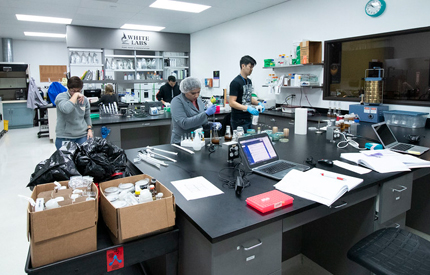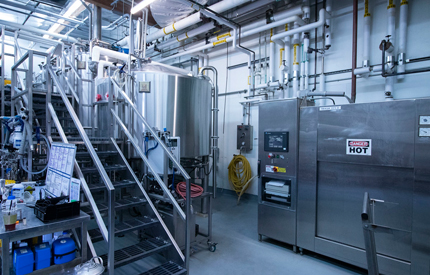Industry Leader’s Passion for Chemistry Ferments Career
April 17, 2020 | By Cynthia Dillon
 Tanks and sterilization equipment at White Labs. Photo by Michelle Fredricks, UC San Diego Physical Sciences
Tanks and sterilization equipment at White Labs. Photo by Michelle Fredricks, UC San Diego Physical Sciences
Proteins are the building blocks of life. For Chris White, they are the building blocks of a career. A leader in the home brewing and fermentation industry, the UC San Diego alumnus-turned-CEO studied protein structure and function as a doctoral student on campus. He used his experiences as an industry intern to eventually establish White Labs, Inc. The San Diego-based company and tasting room—with facilities, including a restaurant, in Asheville, North Carolina, and Copenhagen, Denmark—specializes in propagating yeast cultures.
As an undergraduate studying chemistry at UC Davis, the San Jose native first took a class in homebrewing from a philosophy student, who later went on to establish Home Brew Mart—an incubator for Ballast Point—one of White’s current customers. After graduating from the university, White accepted an internship at a biotech firm in San Diego.
“The internship was powerful because it made me think differently—I saw that people who were happy in their lab jobs were leaders with PhDs, which sent me back to graduate school,” said White (MS, ’93; PhD, ’96). At UC San Diego he worked with Professor Elizabeth Komives in the Department of Chemistry and Biochemistry. He credits her with encouraging his passion for chemistry, supporting his projects and providing ample lab access, which led to good educational experiences.
“I was sent toward yeast expressions and used the information and analysis I amassed to further my home brewing,” said White, now a patent holder.
Stretching the Limits
 Tanks and sterilization equipment at White Labs. Photo by Michelle Fredricks, UC San Diego Physical Sciences
Tanks and sterilization equipment at White Labs. Photo by Michelle Fredricks, UC San Diego Physical Sciences
White’s mission every day at White Labs is to stretch the limits of science in order to set new standards in purity and freshness. In true Triton spirit, he describes himself as curious, focused and dedicated to meeting the challenge of innovation in a highly competitive industry. Having technical training helped him when it came to collecting yeast strains.
From the industry’s first pitchable liquid yeast to a complete revolution in the way it’s propagated and packaged, White’s lab works to create the best, most environmentally friendly products, using them to inspire a culture of education and collaboration among brewers, distillers and winemakers the world over.
“From a business perspective, I just tried to make great beer and wanted to help great companies make great products,” said White. “If you’re growing a business, the U.S. is only part of the global community.”
Path to Innovation Includes Humility, Focus
White said that the PhD program at UC San Diego was a great thing for him in terms of teaching humility—gained from experiences giving presentations and providing proof. “You can’t fool anybody there, everyone is so smart,” he said, adding that it was a great learning experience for an entrepreneur.
“I encourage my staff to create and find their own path,” said White. “The biggest challenge in the industry is innovation. I was always planning experiments in grad school. We made our own things happen, being curious, part of a team and proving yourself. I notice my employees who are engaged like that.”
He said that he pushed his interest and went after internships without paying attention to the odds of succeeding. He was offered other jobs with big salaries because of his experience and yeast strains, but he turned them down because he believed in the lab’s vision.
“I just never got distracted and kept my focus, whether I was in the lab or the library,” said White, who wrote a book titled, “Yeast: The Practical Guide to Yeast Fermentation,” which bridges the technical side of the industry and the consumers. “I’m doing chemistry stuff everyday teaching in a chemistry lab that analyzes beverages. It has all tied together nicely.”
Fermentation in the Face of Covid-19
For White Labs, “chemistry stuff” now includes implementing CDC guidelines, such as sanitation, social distancing and having most people work from home.
“We continue to produce yeast cultures for the food and beverage industries, with smaller teams. Early on we implemented mask, gloves and temperature checks for on-site staff as safety measures,” White said. “I understand the need for supplies for health-care workers and first responders, but I believe telling people in the U.S. to not wear masks because they don't help, if not sick, was a big mistake. Fortunately, that has changed in many areas and critical supplies are increasing.”
For an industry where innovation is a driver, White said that it is difficult to achieve during this time.
“We have focused on 'human based innovation'—projects we can do with ideas, with people communicating from home-based meetings,” said White.
As far as long-term impacts on the workplace, White said he believes that more people will work from home. He added, “And the ways companies have learned to manufacture, innovate and communicate will continue through the year and possibly longer

